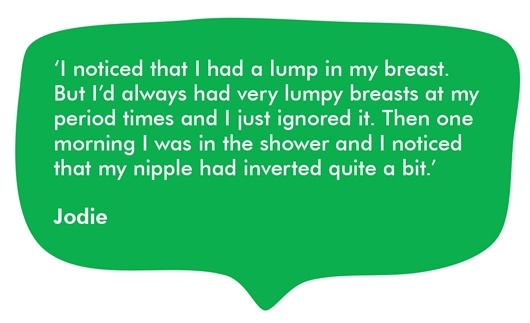October is Breast Cancer Awareness Month. Breast cancer is the most common cancer in the UK. It mainly affects women, but rarely can affect men too. This blog focuses on breast cancer in women. We have information on our website and a recent blog about breast cancer in men.
In this blog, we explain what breast changes to look out for, what breast screening is, and the main risk factors for breast cancer. We also let you know where you can get further information and support.
Breast awareness
It is important for women to be aware of how their breasts normally look and feel, so they can recognise any changes. Your breasts change throughout your life. Learning how they look and feel at different times helps you know what is normal for you. For example, you can do this in the bath or shower, or when getting dressed. If you are not sure what to do, ask your practice nurse or GP for advice.
Changes to look for include:
Most breast lumps are not cancer. But it is important to get any of these symptoms or anything that is unusual for you checked by your GP straight away.

Breast screening
In the UK, women between 50 and 70 and registered with a GP are invited to have breast screening every three years. Breast screening involves having a mammogram (breast x-ray). It is a way of finding breast cancer early, when you need less treatment and treatment is more likely to be effective.
You will still need to see your GP if you notice any of the changes we have mentioned above.
If you are over 70, you can continue to have regular mammograms by contacting your GP or a breast screening clinic to arrange an appointment.
You may find our recent blog on 10 things you should know about breast screening helpful.
What are the risk factors for breast cancer?
Certain factors (risk factors) can increase the chance of developing breast cancer. Breast cancer is likely to be caused by a combination of risk factors rather than just one.
Possible risk factors for breast cancer include:
We have more information about cancer and family history. We also have a leaflet for people who are worried about their breast cancer risk.
Where can I get further information and support?
You can read more about breast cancer in our booklet Understanding breast cancer in women. We also have information about breast cancer on our website.
You can call our cancer support specialists on 0808 808 00 00, or you could visit our Online Community to talk to people affected by breast cancer.
There are also other organisations that can provide information and support to people affected by breast cancer. These include:
To see what else Macmillan's cancer information team has been blogging about, please visit our blog home page! You can subscribe to receive our blogs by email or RSS too.
We're with you every step of the way
The Macmillan team is here to help. Our cancer support specialists can answer your questions, offer support, or simply listen if you need a chat. Call us free on 0808 808 00 00.
Comments? Feel free to add them below (you need to be logged in).
Keep in touch Follow Macmillan’s cancer information team on Twitter @mac_cancerinfo
Whatever cancer throws your way, we’re right there with you.
We’re here to provide physical, financial and emotional support.
© Macmillan Cancer Support 2025 © Macmillan Cancer Support, registered charity in England and Wales (261017), Scotland (SC039907) and the Isle of Man (604). Also operating in Northern Ireland. A company limited by guarantee, registered in England and Wales company number 2400969. Isle of Man company number 4694F. Registered office: 3rd Floor, Bronze Building, The Forge, 105 Sumner Street, London, SE1 9HZ. VAT no: 668265007